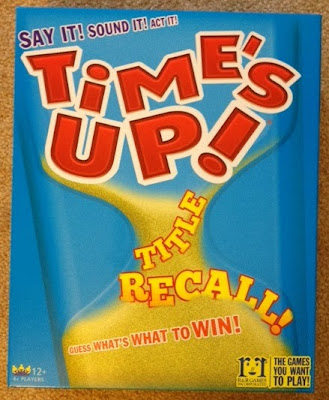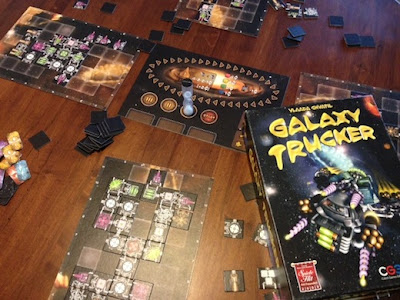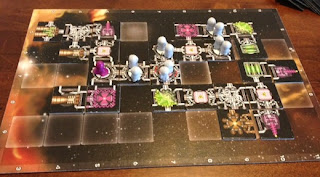This review of Pixel Tactics 2 is brought to you by guest reviewer Jim F.
Pixel Tactics 2 is a stand alone sequel to 2012’s Pixel Tactics that can also be used to expand the original game. Both games were designed and published by D. Brad Dalton and Level 99 Games, respectively.
In Pixel Tactics 2, players control a leader and a group of fighters of varying fantasy classes in a tactical battle against 1 opponent. Each player will have a hand of cards, and a 3x3 grid in front of her, called her unit. Each player’s unit is a 3x3 grid. Before the game proper begins, each player will place a leader in the center spot. During the game, a player’s unit is made up of 3 ranks - vanguard, flank, and rear. When played to her unit this way, the cards represent Heroes that will have a different ability depending on which rank it was played to. Cards can also be played directly from a player’s hand as an Order (usually an instant, one-time event).
Gameplay proceeds through waves, one for each rank. So, during the Vanguard wave, each player will get two actions, only able to recruit, move, attack, etc., with heroes in the vanguard rank. The other two ranks will get a wave, and then gameplay moves back to the vanguard wave, with the first player marker changing hands. The game goes forward thusly, until one of the player’s Leader is reduced to 0 (or lower) health. The rules say that players should play best of 3 or 5.
The first pro I have for Pixel Tactics 2 is the sheer variety of everything you get in the box. Each and every card can be used in 5 different ways. One of those ways is to be played as a unit’s Leader. Leaders have powerful ongoing abilities that will drastically change a player’s overall strategy from game to game. That by itself lends a huge replayability and variability factor. Add to that the fact that all the Heroes you can play in the game will also have varying powers depending on where they are placed, and the game starts to feel almost infinite in its possibilities.
The next pro I have to Pixel Tactics 2 is its simplicity. Despite all the variable uses for each card, the overall structure of the game is quite simple. Each player takes two actions that correspond to the phasing rank, and then they move on to the next rank and repeat until one of the Leaders is killed. That’s it. I think Brad (the designer) realized that since the cards permit so much rules breaking, it was important to keep the rules structure that drives the game easy to understand.
My last pro for the game is that it does a good job of making players feel very powerful - with all the awesome options for Leaders and Heroes and Orders - but it also does a great job of making players feel very limited, and thus gameplay is very tense. I think there are two main factors that contribute to this feeling. First, card and hand management is very important in this game, so drawing more cards is very important, but with only two actions per turn, spending an action to draw one card is an agonizing decision every time. The second thing that contributes to the game’s tension is the fact that players are not allowed to attack with Heroes that have been moved or recruited during the current turn. This ensures that players need to play Heroes they wish to use next time around, and ensure that said Hero survives until then!
 Pixel Tactics 2 is a strong design that I’m sure adds to the experience of Pixel Tactics. The game does have its flaws, however. The first con that comes to mind goes along with my first pro. There is so much to do with each card, that the game can get bogged down with new players or AP prone players. [Josh’s note: “AP” stands for “Analysis Paralysis” - the situation when a player spends large amounts of time thinking about each move.] This can change this tactical battle game into a drawn out, overly long game.
Pixel Tactics 2 is a strong design that I’m sure adds to the experience of Pixel Tactics. The game does have its flaws, however. The first con that comes to mind goes along with my first pro. There is so much to do with each card, that the game can get bogged down with new players or AP prone players. [Josh’s note: “AP” stands for “Analysis Paralysis” - the situation when a player spends large amounts of time thinking about each move.] This can change this tactical battle game into a drawn out, overly long game.
The next con I have is also related to another of my pros. The limitation of only two actions per turn was a little too limiting for me. I would have liked at least one more action per turn. As it is, the game does produce a great sense of tension and scarcity, but I would have liked it if the game moved a little bit faster. Even without an AP opponent, with only two actions per turn, the game can take a little bit longer than I would have liked to develop.
Overall Pixel Tactics 2 is a very solid game that just did not jive with me. I would give it a 7.0/10. I absolutely see the innovative and creative ways cards are being used here, and am not surprised in the least to see that the game has such a strong cult following. This game falls solidly in with other games that I would never ask to play, but that I would also rarely say no to if asked by someone else. I generally do enjoy these style of card based tactical battle games, but for me, this one took too long and felt too restrained me too much to enjoy it.
If Pixel Tactics 2 sounds interesting, you should also check out 51st State, Omen: A Reign of War, and Revolver.
I would like to thank Level 99 Games for providing a review copy of Pixel Tactics 2.
Final Note: The images from this post were originally posted on BoardGameGeek.com, and were used with permission of the publisher.
Pixel Tactics 2 is a stand alone sequel to 2012’s Pixel Tactics that can also be used to expand the original game. Both games were designed and published by D. Brad Dalton and Level 99 Games, respectively.
In Pixel Tactics 2, players control a leader and a group of fighters of varying fantasy classes in a tactical battle against 1 opponent. Each player will have a hand of cards, and a 3x3 grid in front of her, called her unit. Each player’s unit is a 3x3 grid. Before the game proper begins, each player will place a leader in the center spot. During the game, a player’s unit is made up of 3 ranks - vanguard, flank, and rear. When played to her unit this way, the cards represent Heroes that will have a different ability depending on which rank it was played to. Cards can also be played directly from a player’s hand as an Order (usually an instant, one-time event).
Gameplay proceeds through waves, one for each rank. So, during the Vanguard wave, each player will get two actions, only able to recruit, move, attack, etc., with heroes in the vanguard rank. The other two ranks will get a wave, and then gameplay moves back to the vanguard wave, with the first player marker changing hands. The game goes forward thusly, until one of the player’s Leader is reduced to 0 (or lower) health. The rules say that players should play best of 3 or 5.
The first pro I have for Pixel Tactics 2 is the sheer variety of everything you get in the box. Each and every card can be used in 5 different ways. One of those ways is to be played as a unit’s Leader. Leaders have powerful ongoing abilities that will drastically change a player’s overall strategy from game to game. That by itself lends a huge replayability and variability factor. Add to that the fact that all the Heroes you can play in the game will also have varying powers depending on where they are placed, and the game starts to feel almost infinite in its possibilities.
The next pro I have to Pixel Tactics 2 is its simplicity. Despite all the variable uses for each card, the overall structure of the game is quite simple. Each player takes two actions that correspond to the phasing rank, and then they move on to the next rank and repeat until one of the Leaders is killed. That’s it. I think Brad (the designer) realized that since the cards permit so much rules breaking, it was important to keep the rules structure that drives the game easy to understand.
My last pro for the game is that it does a good job of making players feel very powerful - with all the awesome options for Leaders and Heroes and Orders - but it also does a great job of making players feel very limited, and thus gameplay is very tense. I think there are two main factors that contribute to this feeling. First, card and hand management is very important in this game, so drawing more cards is very important, but with only two actions per turn, spending an action to draw one card is an agonizing decision every time. The second thing that contributes to the game’s tension is the fact that players are not allowed to attack with Heroes that have been moved or recruited during the current turn. This ensures that players need to play Heroes they wish to use next time around, and ensure that said Hero survives until then!
 Pixel Tactics 2 is a strong design that I’m sure adds to the experience of Pixel Tactics. The game does have its flaws, however. The first con that comes to mind goes along with my first pro. There is so much to do with each card, that the game can get bogged down with new players or AP prone players. [Josh’s note: “AP” stands for “Analysis Paralysis” - the situation when a player spends large amounts of time thinking about each move.] This can change this tactical battle game into a drawn out, overly long game.
Pixel Tactics 2 is a strong design that I’m sure adds to the experience of Pixel Tactics. The game does have its flaws, however. The first con that comes to mind goes along with my first pro. There is so much to do with each card, that the game can get bogged down with new players or AP prone players. [Josh’s note: “AP” stands for “Analysis Paralysis” - the situation when a player spends large amounts of time thinking about each move.] This can change this tactical battle game into a drawn out, overly long game.
The next con I have is also related to another of my pros. The limitation of only two actions per turn was a little too limiting for me. I would have liked at least one more action per turn. As it is, the game does produce a great sense of tension and scarcity, but I would have liked it if the game moved a little bit faster. Even without an AP opponent, with only two actions per turn, the game can take a little bit longer than I would have liked to develop.
Overall Pixel Tactics 2 is a very solid game that just did not jive with me. I would give it a 7.0/10. I absolutely see the innovative and creative ways cards are being used here, and am not surprised in the least to see that the game has such a strong cult following. This game falls solidly in with other games that I would never ask to play, but that I would also rarely say no to if asked by someone else. I generally do enjoy these style of card based tactical battle games, but for me, this one took too long and felt too restrained me too much to enjoy it.
If Pixel Tactics 2 sounds interesting, you should also check out 51st State, Omen: A Reign of War, and Revolver.
I would like to thank Level 99 Games for providing a review copy of Pixel Tactics 2.
Final Note: The images from this post were originally posted on BoardGameGeek.com, and were used with permission of the publisher.













